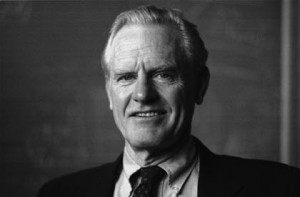World Scientists’ Warning to Humanity

Physicist and Nobel laureate Henry Way Kendall was the primary author of the 1992 “World Scientists’ Warning to Humanity.” (Photo by Donna Coveney)
MECHANICSVILLE, Va.—This post is a change of pace from the commentaries on exploration narratives posted previously. Instead, this post discusses a work that touches upon environmental ethics, which is another component of my dissertation project.
In 1992, the Union of Concerned Scientists published the World Scientists’ Warning to Humanity. The statement, written primarily by physicist Henry Way Kendall, a founding member of the UCS and winner of the 1990 Nobel Prize in physics—with Jerome Friedman and Richard Taylor—for research leading to the development of our understanding of quarks.
The document began with the at-the-time bold statement (for scientists, at least): “Human beings and the natural world are on a collision course.”
It described a number of environmental problems with global consequences. Parts of the list are somewhat dated now, for example, with mentions of the depletion of the ozone layer and acid precipitation (both of which are less of a problem because of concrete steps taken to address them.
Other problems cited are as much of a threat, or even a greater threat, to the residents (including humans) of the planet as they were in 1992, among them: overfishing, soil loss and degradation, shrinking freshwater supplies, habitat and biodiversity loss, climate change and overpopulation.
The statement was signed by most of the living Nobel laureates in the sciences alive at the time. Nearly 1,700 more of the world’s leading scientists added their names in support of the statement.
The statement made five specific recommendations for action (numbers added for clarity):
- We must bring environmentally damaging activities under control to restore and protect the integrity of the earth’s systems we depend on. We must, for example, move away from fossil fuels to more benign, inexhaustible energy sources to cut greenhouse gas emissions and the pollution of our air and water. Priority must be given to the development of energy sources matched to Third World needs—small-scale and relatively easy to implement. We must halt deforestation, injury to and loss of agricultural land, and the loss of terrestrial and marine plant and animal species.
- We must manage resources crucial to human welfare more effectively. We must give high priority to efficient use of energy, water, and other materials, including expansion of conservation and recycling.
- We must stabilize population. This will be possible only if all nations recognize that it requires improved social and economic conditions, and the adoption of effective, voluntary family planning.
- We must reduce and eventually eliminate poverty.
- We must ensure sexual equality, and guarantee women control over their own reproductive decisions. (Union of Concerned Scientists 1992)
The statement added a deeper call to action:
A new ethic is required — a new attitude towards discharging our responsibility for caring for ourselves and for the earth. We must recognize the earth’s limited capacity to provide for us. We must recognize its fragility. We must no longer allow it to be ravaged. This ethic must motivate a great movement, convincing reluctant leaders and reluctant governments and reluctant peoples themselves to effect the needed changes. (Union of Concerned Scientists 1992)
Given the two decades of growing apathy (or worse, hostility) toward the environment that followed the publication of the warning, the call for a new ethic is more urgent than ever.
REFERENCES
Union of Concerned Scientists. 1992. World Scientists’ Warning to Humanity. Accessed July 16, 2014. http://www.ucsusa.org/about/1992-world-scientists.html.
- Ying-Yai Sheng-lan (The Overall Survey of the Ocean’s Shores [1433])
- Journal of the First Voyage of Columbus
